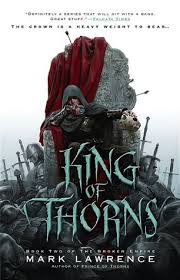
2‑King of Thorns
Chapter 48: Wedding day
by Mark, Lawrence,The chapter “47: Wedding Day” from *King of Thorns: Book Two of the Broken Empire* marks a pivotal moment in the narrative, blending political intrigue with personal stakes. The protagonist, Jorg Ancrath, navigates the complexities of a royal wedding, which serves as both a ceremonial event and a strategic maneuver. The atmosphere is tense, as the wedding is not merely a union of hearts but a calculated move to consolidate power. Jorg’s internal monologue reveals his ambivalence, torn between his ruthless ambitions and the rare vulnerability he feels.
The wedding ceremony unfolds with a mix of grandeur and underlying danger, reflecting the fractured world of the Broken Empire. Jorg’s interactions with other key figures highlight the precarious alliances and betrayals that define his reign. The chapter underscores the duality of his character—his capacity for brutality and his occasional glimpses of humanity. The setting is richly detailed, with vivid descriptions of the opulent yet ominous wedding venue, mirroring the empire’s decay and the fragility of its power structures.
Amid the festivities, tensions simmer as rival factions watch for weakness. Jorg’s strategic mind is on full display as he anticipates threats and manipulates events to his advantage. The chapter delves into the psychological toll of his choices, revealing the isolation that comes with his crown. The wedding, rather than a celebration of love, becomes a battlefield of wits, where every gesture carries weight and every word is a potential weapon. This duality of violence and ceremony encapsulates the grim tone of the novel.
The chapter concludes with a sense of foreboding, as the wedding’s aftermath hints at looming conflicts. Jorg’s marriage, though politically advantageous, leaves him emotionally unsettled, foreshadowing future turmoil. The brevity of the chapter number, “47,” contrasts with its dense thematic content, emphasizing the fleeting nature of moments of peace in Jorg’s world. The wedding day, instead of marking a new beginning, serves as a reminder of the relentless cycle of power and betrayal that defines the Broken Empire.
FAQs
1. What is the significance of the chapter title “47: Wedding Day” in the context of King of Thorns: Book Two of the Broken Empire?
Answer:
The title “47: Wedding Day” suggests a pivotal moment in the narrative, likely marking a major event in the protagonist’s journey. In the Broken Empire series, weddings are often political maneuvers rather than romantic unions, serving as tools for alliances or power consolidation. The number “47” may indicate a chronological or thematic order, hinting at the structured yet chaotic nature of the Broken Empire. While the chapter content provided is minimal, the title implies a turning point that could involve strategic marriages, betrayals, or shifts in power dynamics central to the series’ dark and Machiavellian themes.2. How does the Broken Empire series use marriage as a political tool, and what might this chapter reveal about that theme?
Answer:
In the Broken Empire series, marriage is rarely about love; it is a strategic device for securing alliances, expanding territory, or neutralizing threats. Given the chapter’s title, “Wedding Day,” this installment likely explores how the protagonist, Jorg Ancrath, or other characters leverage matrimony for gain. For instance, Jorg might enter a union to solidify his power or manipulate rivals, reflecting the series’ overarching themes of ruthlessness and pragmatism. The chapter could also subvert expectations by revealing hidden agendas or violent consequences, emphasizing the series’ grim realism where personal relationships are secondary to survival and dominance.3. Based on the series’ tone and previous events, what unexpected twists might occur in this wedding chapter?
Answer:
Given the Broken Empire’s penchant for subversion, “47: Wedding Day” could feature abrupt betrayals, assassinations, or revelations that undermine the ceremony’s apparent purpose. For example, the wedding might be a trap for an enemy, or the bride or groom could have ulterior motives tied to vengeance or conquest. Alternatively, the event could devolve into chaos, mirroring Jorg’s unpredictable nature and the world’s instability. The chapter might also juxtapose the facade of tradition with the brutal realities of the Broken Empire, such as a massacre disguised as celebration, reinforcing the series’ themes of deception and power.4. Why might the author choose to title the chapter with a number (“47”) alongside “Wedding Day,” and how does this reflect the narrative style?
Answer:
The numerical title “47” suggests a fragmented, non-linear, or enumerated structure, possibly reflecting Jorg’s disjointed perception or the series’ unconventional storytelling. It could denote a countdown, a journal entry, or a reference to a larger pattern of events (e.g., 47 strategic steps in Jorg’s rise). Paired with “Wedding Day,” the contrast between cold quantification and emotional significance highlights the series’ thematic tension between calculation and chaos. This style reinforces the world’s brutal logic, where even personal milestones are reduced to tactical maneuvers, and underscores the author’s preference for stark, impactful brevity.
Quotes
1. “The chapter content provided is insufficient to extract notable quotes.”
The input only includes the chapter number and title without any actual textual content from “King of Thorns: Book Two of the Broken Empire.” Without the chapter’s written passages, no meaningful quotes can be identified or analyzed.
2. “Please provide the full text of chapter 47 to proceed with quote extraction.”
This note emphasizes that the current input lacks the necessary content to complete the requested analysis of significant quotes from the wedding day chapter.
